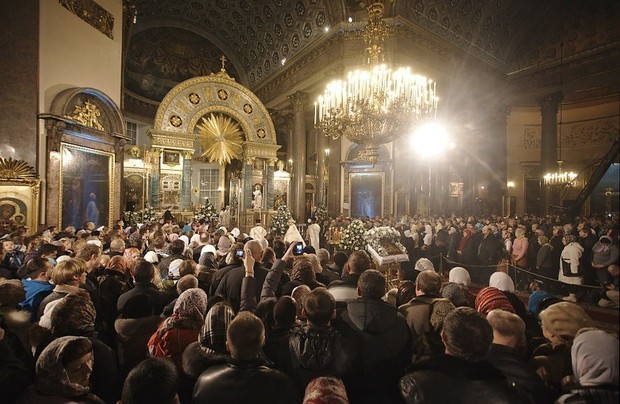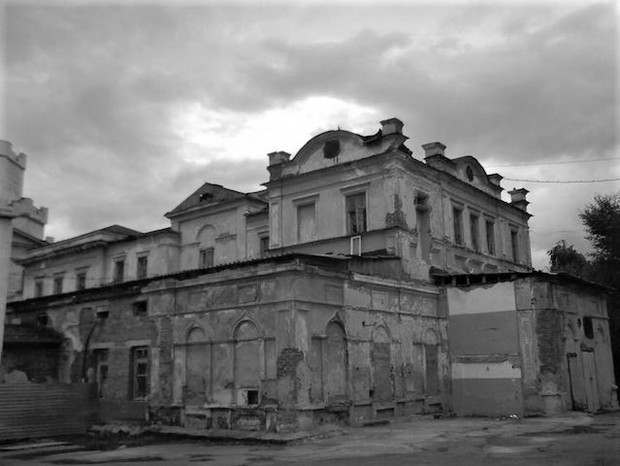Vsevolod Chaplin: ''In case of religious buildings, for some reason, protests aggravate on the eve of elections''
Why do religious people need temples? Archpriest Vsevolod Chaplin’s column
The scandal around the transition of Saint Isaac's Cathedral in Saint Petersburg has not calmed down yet while a new one linked with the Russian Orthodox Church broke out. The building of the 18-century Assumption Church of Novo-Tikhvinsky Feminine Monastery was demolished in Yekaterinburg. In an op-ed column written for Realnoe Vremya, Archpriest Vsevolod Chaplin wonders why religious people need temples. The op-ed columnist notes who is behind protests movements against the Church and transition of the property it was divested of.
Country's duty: to return property to religious people
It seems that some of our co-citizens live on another planet. So they think for some reason that all our people approve current financial capitalism or that social system that was pushed in a hurry in 1991 and 1993. Or they think the attitude to religion remained at the level of the early nineties. And they wonder why people need new churches and reconstruction of old ones. Why are few temples given where museum workers still rule?
Poland and Baltic countries have never raised this question for some reason. After the end of the ''socialistic'' time, religious communities were returned all property taken away by fighting atheists, including revenue houses and land. In Russia, the process took 20 years – and it has not ended yet. A law On Restitution of Religious Property in State or Municipal Ownership to Religious Organisations was created after lasting and vehement debates.
They tried to reach a compromise on this text for a long time – the Duma had bills on restitution of religious property offered by particularly Ivan Starikov and Sergey Glaziev as early as the 90s. However, these projects were banned by market fundamentalists from the economic block of the executive power – these people who provided privatisation of state property in the interests of new magnates disliked the idea of property restitution in favour of pre-revolutionary owners. The ''new elite'' was not connected with their ancestors and legal successors at all. Moreover, religious communities were not allowed to join the privatisation process – even if they were talking about churches, mosques, synagogues, datsans.

''88 items from the State Museum of the History of Religion are already in the Kazan Cathedral that was given to the Church, and nobody saw anything illegal.'' Photo: fiesta.city
The law, which was adopted in the end, presupposes a duty of the country – precisely duty, so that nobody would oppose – to give the property for religious purposes to religious communities within six years. Unfortunately, it is not the logic of restitution but recognition that the secular country doesn't need a religious property and it gives it to ''specialised'' communities.
There is no withdrawal from this duty – as much as the opponents of transition of Saint Isaac's Cathedral tried to prove the contrary. Even if items of the Museum Fund are in the building, the state must give the construction without depending on whether these items will be replaced or remain under the supervision of the museum where the religious community becomes the owner or user being in the building. Moreover, 88 items from the State Museum of the History of Religion are already in the Kazan Cathedral that was given to the Church, and nobody saw anything illegal. The church almost refused the return of ''non-religious'' property, for instance, fields and woods in one of the Bishops' Councils as a compromise.
Who is against temples?
It all needs to be explained again to some representatives of the liberal community suddenly 7 years later – but they don't hear and don't want to hear. An impassioned campaign against the transition of Saint Isaac's Dalmatsky Cathedral almost exhausted juridical arguments and switched to emotional ''arguments'' like ''We won't give, and that's it!'', ''Come on, for museum!''.
Almost similar ''arguments'' are usually used against the construction of new temples, mosques and synagogues in dormitory districts where religious buildings are very needed. Yes, local residents are usually against any new construction near their houses. But for some reason, in case of religious buildings, they try to deliver protests to almost all-national level. For some reason, they aggravate on the eve of elections. Yabloko representatives – liberal intellectuals who are about to retire or already did it — unchangeably participate there. Initially, activists of the Communist Party of the Russian Federation joined it. But it seems that their administration decided they did not need to quarrel with religious people of the party. Now, at least in Saint Petersburg, Ф Just Russia, again in the person of intellectuals of an older generation joined the protests. It is a sign that local people who are actively supported by opposition parties don't have a great desire to be against the erection of elite flats and other commercial new-build properties. It is safer to fight against religious people…
The most unexpected reasons are used. For instance, debates around the reconstruction method of the Assumption Cathedral of Novo-Tikhvinsky Monastery in Yekaterinburg. As far as I am concerned, fractures in the walls of this ancient building made their conservation impossible. The building will be erected again. Mayor of the city Evgeny Roizman says: ''Those who decided to reconstruct found out that the walls are old, it won't be possible to restore the church on the old foundation. This is why they decided it will be easier to demolish and build a new church according to drawing.'' But the Church is accused again of… a barbarian destruction of the temple. And I think the politicised and biased attitude to Orthodox Christianity and maybe to religion, in general, is the major reason.

''Somebody doesn't want renascence of Holy Rus''
Many people who are keen on the Soviet or Western culture simply refuse to see and understand religious people who live near. They are even ready to say that there are 2-3% of religious people, that is to say, it is a minority, marginal who are not worthy of attention and being taken into account. Yes, there are few praying people on working days, especially when there is not a church service – no more than in sports buildings or libraries. Less than at schools during unsocial hours. But we have more people who are Orthodox Christians and Muslims than schoolchildren or people who are keen on sport. According to many surveys and my personal observations, from 1/4 to 1/3 of the population of the country read religious books, pray at least once a year and visit a religious building, know something about their religion. If their temple is close to them, they will probably visit it more often.
Of course, public hearings need to take place before construction of a temple – and they do. Probably not always correctly – and it is necessary to provide their maximum openness, without a hitch. The opinion of the majority needs to be listened to. But we can't lose to groups of shouters who depend on political interests. ''We are living in such a period,'' Metropolitan of Tom Rostislav talks about one of the conflicts linked with construction,'' — when every person has the right to vote, has the right to express their opinion. But on the other hand, freedom doesn't presuppose a return to totalitarianism. For instance, if somebody doesn't need a chapel, it doesn't mean others don't need it. <…> Somebody doesn't want renascence of Holy Rus. Somebody doesn't want the process that began in the 1980s of the last century to develop further.''